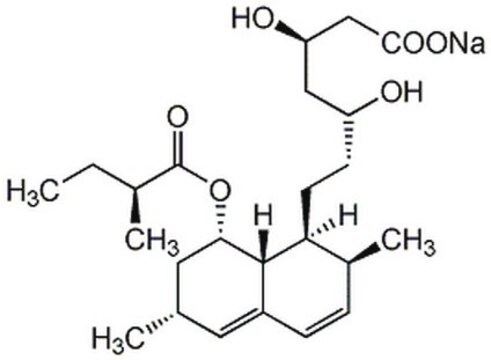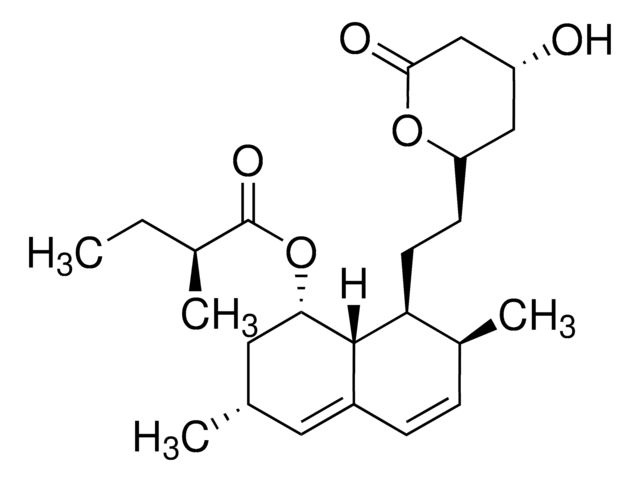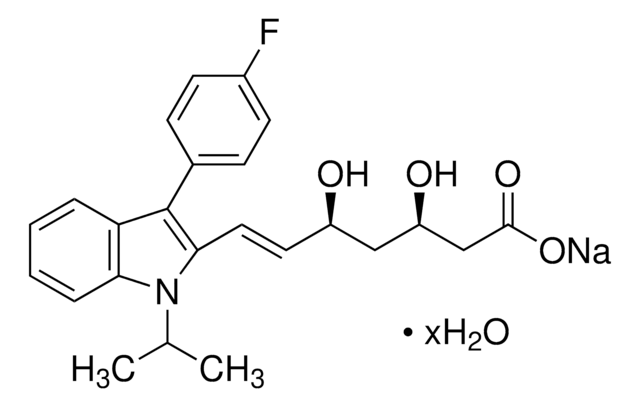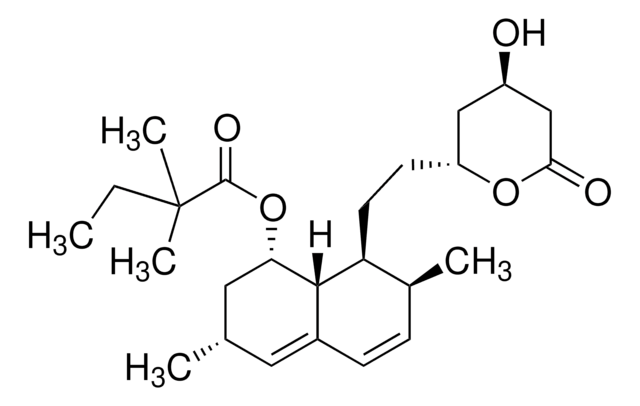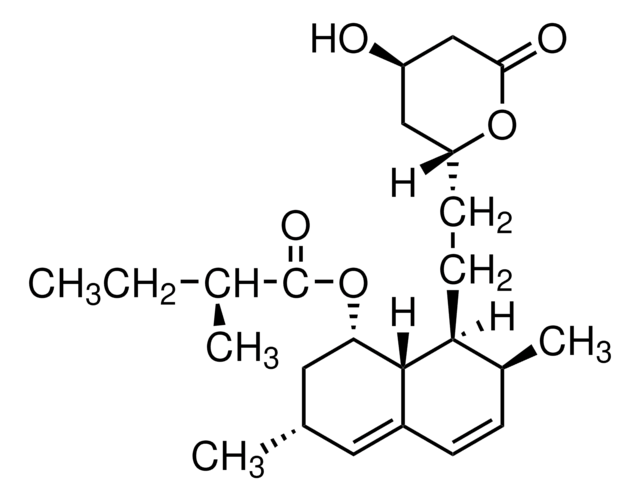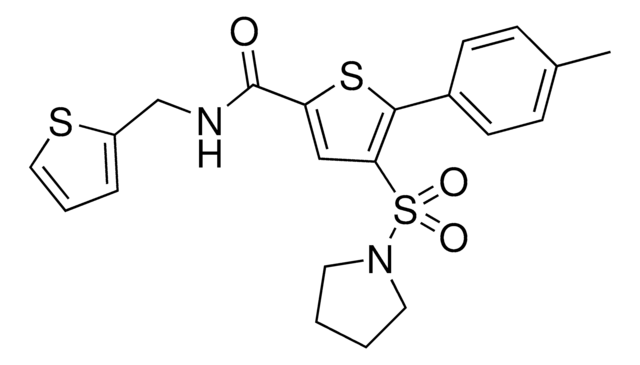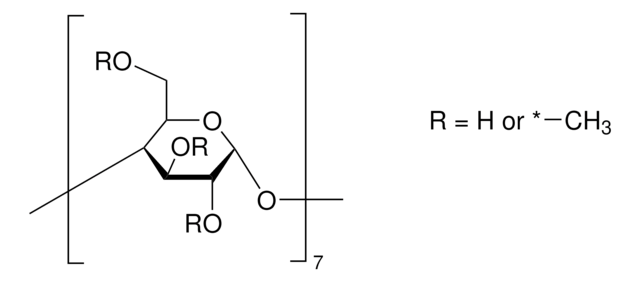438187
Lovastatin, Sodium Salt
InSolution ≥95%
Synonim(y):
InSolution Lovastatin, Sodium Salt
Zaloguj sięWyświetlanie cen organizacyjnych i kontraktowych
About This Item
Wzór empiryczny (zapis Hilla):
C24H37O6 · Na
Masa cząsteczkowa:
444.54
Kod UNSPSC:
51111800
NACRES:
NA.77
Polecane produkty
Poziom jakości
Próba
≥95% (HPLC)
Formularz
liquid
producent / nazwa handlowa
Calbiochem®
warunki przechowywania
OK to freeze
avoid repeated freeze/thaw cycles
protect from light
Warunki transportu
dry ice
temp. przechowywania
−70°C
Opis ogólny
Carboxylate form of Lovastatin (Cat. No. 438185) that is active in whole cells and cell-free assays. Lovastatin is reported to be an anti-hypercholesterolemic agent that acts as a reversible competitive inhibitor of 3-hydroxy-3-methylglutaryl coenzyme A (HMG-CoA) reductase and blocks a series of biological events including activation of p21ras by insulin in 3T3-L1 fibroblasts and 3T3-L1 adipocytes, farnesylation of p21ras, which decreases the pool of intracellular Ras available for subsequent activation by growth factors (including insulin), and N-ras-induced neuronal differentiation. Causes cell cycle arrest in the late G1 phase. Shown to inhibit the stimulation of MAP kinase by insulin in HIRcB cells and block the transcription of the type-I SCR gene in THP-1-derived macrophages. Also blocks PDGF receptor tyrosine phosphorylation and MAP kinase activation by PDGF.
Działania biochem./fizjol.
Cell permeable: yes
Primary Target
HMG-CoA reductase
HMG-CoA reductase
Reversible: yes
Opakowanie
Packaged under inert gas
Ostrzeżenie
Toxicity: Harmful (C)
Postać fizyczna
A 10 mM (5 mg/1.13 ml) solution of Lovastatin, Sodium Salt (Cat. No. 438186) in H₂O.
Rekonstytucja
Following initial thaw, aliquot and freeze (-70°C). Aliquots are stable for up to 6 months at -70°C.
Inne uwagi
Rao, S., et al. 1999. Proc. Natl. Acad. Sci. USA96, 7197.
Carel, K., et al. 1996. J. Biol. Chem.271, 30625.
McGuire, T.F., et al. 1996. J. Biol. Chem.271, 27402.
Umetani, N., et al. 1996. Biochim. Biophys. Acta1303, 199.
Xu, X.Q., et al. 1996. Arch. Biochem. Biophys.326, 233.
Reusch, J.E.-B., et al. 1995. J. Biol. Chem.270, 2036.
Carel, K., et al. 1996. J. Biol. Chem.271, 30625.
McGuire, T.F., et al. 1996. J. Biol. Chem.271, 27402.
Umetani, N., et al. 1996. Biochim. Biophys. Acta1303, 199.
Xu, X.Q., et al. 1996. Arch. Biochem. Biophys.326, 233.
Reusch, J.E.-B., et al. 1995. J. Biol. Chem.270, 2036.
Informacje prawne
CALBIOCHEM is a registered trademark of Merck KGaA, Darmstadt, Germany
Ta strona może zawierać tekst przetłumaczony maszynowo.
Kod klasy składowania
12 - Non Combustible Liquids
Klasa zagrożenia wodnego (WGK)
nwg
Temperatura zapłonu (°F)
Not applicable
Temperatura zapłonu (°C)
Not applicable
Certyfikaty analizy (CoA)
Poszukaj Certyfikaty analizy (CoA), wpisując numer partii/serii produktów. Numery serii i partii można znaleźć na etykiecie produktu po słowach „seria” lub „partia”.
Masz już ten produkt?
Dokumenty związane z niedawno zakupionymi produktami zostały zamieszczone w Bibliotece dokumentów.
Patrícia M R Pereira et al.
Clinical cancer research : an official journal of the American Association for Cancer Research, 26(23), 6215-6229 (2020-10-02)
Statins are cholesterol-depleting drugs used to treat patients with hypercholesterolemia. Preclinically, statins disrupt trafficking of receptors present at the cell membrane. Membrane receptors, defined as tumor biomarkers and therapeutic targets, are often internalized by an endocytic pathway. Indeed, receptor endocytosis
Nasz zespół naukowców ma doświadczenie we wszystkich obszarach badań, w tym w naukach przyrodniczych, materiałoznawstwie, syntezie chemicznej, chromatografii, analityce i wielu innych dziedzinach.
Skontaktuj się z zespołem ds. pomocy technicznej
